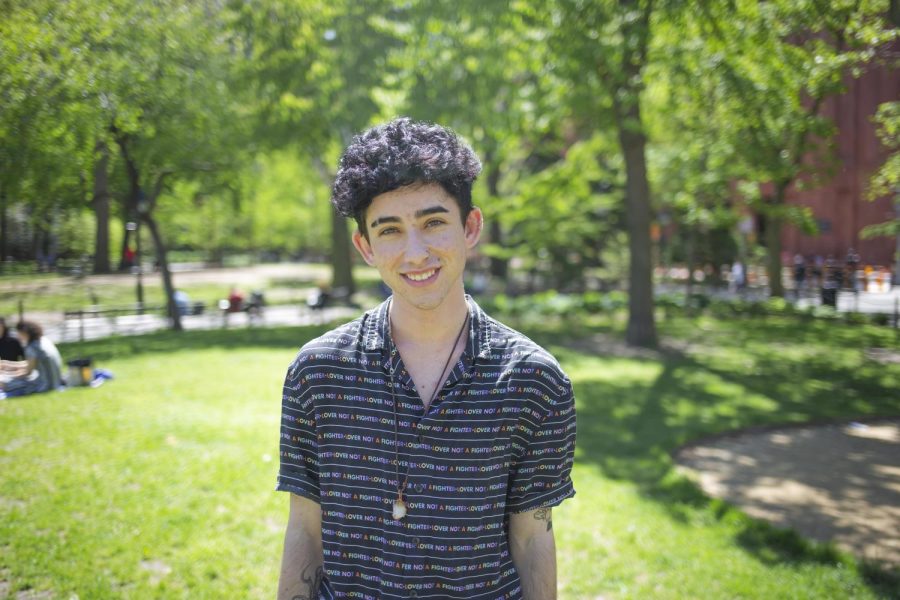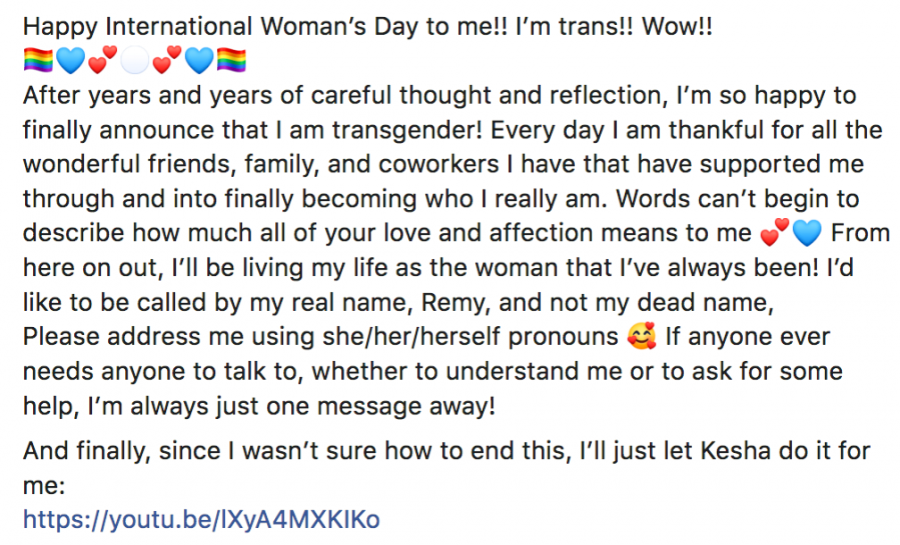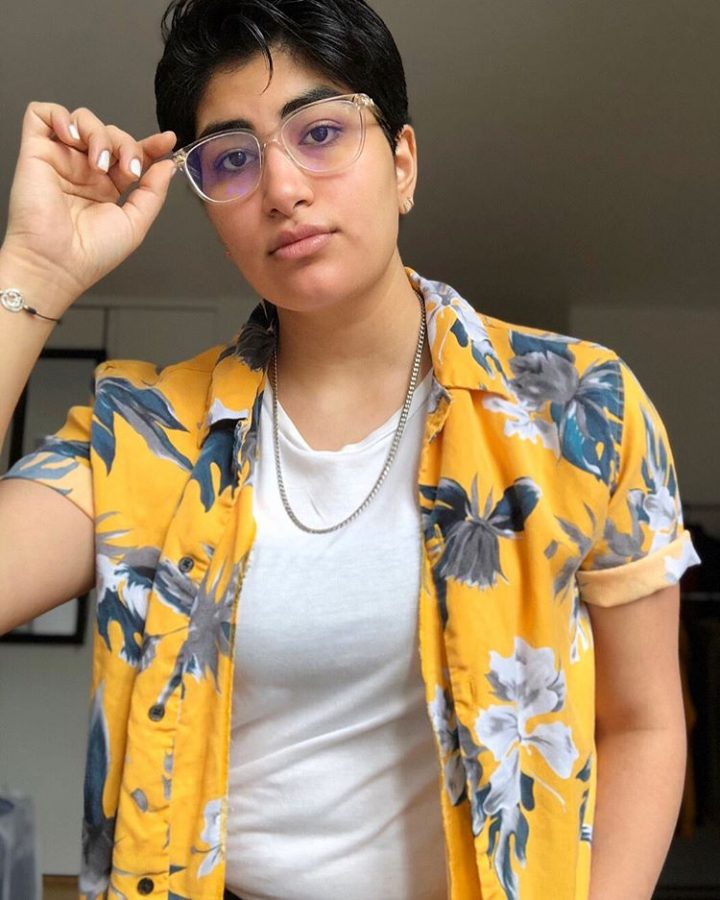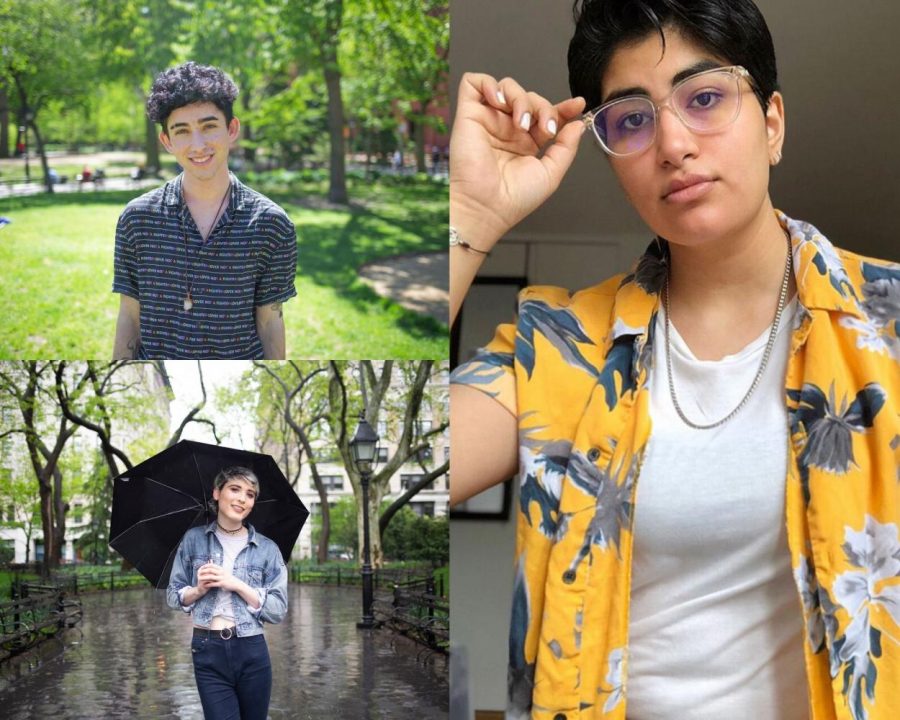Dear reader, here you will find three stories of transgender and genderqueer students from NYU. All of them embarked on separate journeys of self-discovery and self-acceptance once they found themselves in college. They faced various challenges along the way and preserved in their goal of living at their most authentic selves.
A Hard Promise to Keep
For August, attending NYU was a dream come true.
They had come out as transgender at the beginning of their high school career. NYU’s location in Greenwich Village, a hub for the LGBTQ+ movement and home to the Stonewall Inn, presented an exciting experience suited for August.
New York, and NYU by proxy, associates with a queer-friendly climate. At the university, such an environment was created by the clubs and alliances run by and for LGBTQ+ students and staff members from all across the spectrum. There’s also a graduation ceremony that celebrates queer students and The Gender and Sexuality Team at the Student Health Center, helping transgender and gender-nonconforming individuals transition, explore their identities in a safer environment and live as their authentic selves.
August, now a Steinhardt graduate, turned their tassel at Yankee Stadium last May. They had spent their last four years at NYU coming into themselves as an active member of NYU’s LQBTQ+ community and the president of T-Party, a safe space on campus for TGNC individuals.

August saw NYU as their excuse to get as far as physically possible from LA, where they were stuck in an inhibiting home environment with their father, an avid conservative, and their mother, misinformed on LGBTQ+ issues. But, in preparation for the cross-country move, August had a difficult promise to keep.
“[My parents] said I was going to NYU if I don’t medically transition,” August said. “My tuition was on the line. I agreed. It was either go to my dream school or not go to my dream school.”
With this, August left for New York. Regardless, they were excited for a change in the environment. But they never really intended on keeping their promise to their parents. They spent their first two years getting acclimated to college life, but the promise they made weighed heavy on their mind.
“My dysphoria was getting worse, and I was going into such deep depression watching all of my friends transition,” August said. “Just knowing that there was this thing I could be doing for myself, but there was this arbitrary reason that I couldn’t.”
Junior year came and August pushed their fear of backlash from their family aside, concerned more with their own happiness and decided to start medically transitioning.
In preparation to medically transition, many transgender individuals decide to take either testosterone or estrogen to develop masculine or feminine traits, respectively, a procedure known as Hormone Replacement Therapy. After completing a blood test at the Student Health Center, it was determined that they were healthy enough to get on testosterone. Hormones can be taken in a variety of ways, including applying a hormone-induced gel on your shoulder or forearm and receiving intramuscular injections. August started taking hormones at the beginning of their junior year in the form of AndroGel gel pumps.
After August’s parents found out through an insurance company notification, they took August off their insurance plan and presented an ultimatum: If August wanted to stay at NYU, they had to stop taking hormones. August refused and, eventually, their parents agreed to keep paying their tuition if they saw a therapist in the city.
After being on testosterone for nearly two years, August decided to get top surgery, a common type of gender-confirmation surgery which involves breast removal in order to create a masculine chest. With no medical insurance from their parents, August needed alternative payment methods to cover the surgery. Luckily for them, NYU’s Consolidated Health Plan partially covered it. The rest came from August’s GoFundMe, August’s Transition Fund. Many things changed for August since their surgery, even their relationship with their parents improved.
“Things are good between me and my parents right now, I think,” August said with a smile. “A lot of their transphobia is seeded in fear that me being trans will hinder me in some way. It’s up to them to do the work on other people instead of working on me. Working on other people being comfortable with me.”
Taking Your Time
With a coffee cup in her hand, Remy Elliott looks serene. Her saturated pink lipstick seems to be exactly the right shade to match her pale purple blouse. Her mouth forms a slight smile. When she talks, her voice is soft.
Steinhardt Master’s in Childhood Education student Elliott publicly came out as transgender during her senior year in college. Elliott began by coming out to her close friends only. Feeling their acceptance of her authentic identity, she made an announcement on Facebook for International Women’s Day in March of 2019, hoping to reach her hometown friends, acquaintances and distant family alike.
“After years and years of careful thought and reflection, I’m so happy to finally announce that I am transgender!” Elliott’s post reads. “From here on out, I’ll be living my life as the woman that I’ve always been! I’d like to be called by my real name, Remy, and not my deadname …”

Coming out later in her college career bore a lot of challenges for Elliott, externally and internally. While she began mentioning her struggle with her then-cis gender identity to friends around her sophomore year, coming out more publicly took time and seeking for validation from within. Elliott was worried she wasn’t “transgender enough.”
“For a long time, I was under the impression that I was trans but will never do anything about it,” Elliott said. “My dysphoria wasn’t so bad that I felt like I was living a lie constantly. I could kind of make it through as a man.”
But the pressure grew as the end of college approached. As a senior majoring in education, she had to have a teaching placement and was assigned to teach in a New York primary school last January.
Wishing to enter her new workplace as her real self, Elliott pushed herself to make a switch from masculine to feminine pronouns.
Contributing to the difficulties was the mismatch in the way Elliott felt and the way she was perceived from the outside. For many transgender individuals, there’s a distinction between coming out and socially transitioning. For some, the two go hand-in-hand. For others, the choice to do one or the other can be more nuanced, involving difficult financial decisions, possible medical roadblocks including health conditions and considerations, lack of appropriate insurance coverage or potential judgement of those closest to the person. While social transitioning usually involves a name change, after which one’s birth name becomes their “deadname,” and a pronouns switch, medical transitioning involves a multitude of procedures, including hormone replacement therapy and top or bottom surgeries.
Even with her determination to finally come out as a trans-woman, she found it difficult to navigate the resistance in her immediate community. The closest of her friends made the switch with no issues but the majority of the community around her struggled with misgendering and deadnaming Elliott.
“Once I started going full-time [as a female] it got easier for people to come to terms with,” Elliott said. “When I was fluid, people had a harder time wrapping their heads around it.”

“After coming out, I didn’t start transitioning immediately,” Elliott said. “I kept wearing masculine clothes and went by my deadname for a while.”
Later in her senior year, Elliott began experimenting with her appearance, practicing different makeup techniques she enjoyed and building a more feminine wardrobe, discovering what clothes she felt most comfortable in. Towards the end of her senior year, Elliott chose to begin HRT and started taking estrogen with the intention of feminizing her appearance further. As an NYU student, she had Comprehensive Healthcare Plan insurance through Wellfleet, which covered the cost of her HRT.
Fitting In With The People You Love
For the Transgender Day of Visibility celebrated on March 31, Somaya Gupta posted a picture of themselves ready to shave, with the shaving cream on their face and a razor in their hand.
“I have a distinct memory of being a kid and watching my dad shave his face and thinking “that looks so fun, I wish I could do that,”” Gupta wrote in the caption. “But growing up as a brown “girl”, I quickly learned that shaving my face was not acceptable … One incredible lesson I’ve learned through accepting my transness is that the instincts you had as a child … were usually right …”
Gupta, who is graduating from Steinhardt this year, identifies as genderqueer and uses any pronouns. Despite being a senior, Gupta finds themselves in the process of still figuring out the labels they feel most comfortable with and where they fall on the gender spectrum.

At some point during their first year, Gupta and their then-roommate went to a friend’s dorm. The friend identifies as non-binary. On their way back, Gupta’s roommate asked what non-binary meant and Gupta explained, ultimately wondering how people ever realized their genderqueerness.
“Does anyone ever feel like their gender?” Gupta asked. “You just say you’re a girl because you were told that, right? But she was like ‘no, you feel like a girl’ and so panic ensued.”
In their sophomore year, Gupta, still silently questioning themselves but leaving the thoughts about their gender identity on the backburner, joined “Shades,” seeking a community of LGBTQ+ people of color who could relate to and understand their intersectional experience.
Throughout their time at NYU, they’ve been involved with LGBTQ+ advocacy as the president of “Shades” — LGBTQ+ Center’s club for Black queer people and queer people of color — and serves as a campus ambassador for GLAAD. While advocating for others, Gupta found themselves on their own journey of self-discovery and self-acceptance.
By their junior year, they had a lot of transgender and genderqueer friends, to whom they related a lot. This allowed them to begin self-discovery without the fear of losing their loved ones.
“Junior year, when I came back from winter break, we had our first ‘Shades’ meeting,” Gupta said. “We all go around and say our names and pronouns. And I said to everyone, when I usually said ‘she and her,’ ‘I’m not sure so I’ll just go with any pronouns.’ After I said that, a couple of people were like ‘woo, that’s cool!’”
All of Gupta’s friends were very supportive when they came out to them. So was Gupta’s older sister, who helped Gupta educate their parents about genderqueer people to avoid possible misunderstandings for whenever Gupta might choose to share their identity with the rest of their family. When they did, their parents accepted their child.
“We were on vacation, I knew they would be more relaxed,” Gupta laughed. “I was saying how in queer spaces it was very common for people to say their pronouns and my mom said ‘well, what pronouns do you say?’ I [said] ‘yeah, I’m genderqueer,’ and my mom was like, wow, shocker! She knew it was coming.”
As a process of their coming out, Gupta began more openly expressing their queerness on social media. They started experimenting with their appearance, cutting their hair because having long hair no longer felt as though it was them. As of late, they have begun posting pictures of the way they changed thanks to the workouts they have taken on to make their body suit their mind better. But medically transitioning by going on testosterone, even though desired, feels like a risk too high to take right now. Gupta’s a musician and their voice might change in unpredictable ways if they were to start HRT.
“So I’m taking more time to think about it, what dosage I would need and finding the right doctor for my situation and stuff,” Gupta said. “I would look forward to being more muscular, my hips being less prominent … wider face and neck! I would look forward to mostly just people looking at me and not automatically assuming I’m a girl.”
For each of these students, their path to becoming and presenting as themselves has been a complex one, and each of them finds themselves at a different place in their journeys.
Right now Gupta is getting ready to graduate, eagerly looking at their future and preparing new music for release. Their single “Do You Ever” will be available for streaming on May 15. August is currently living in New York as an openly trans person with their dog, Frank. They have fully recovered from their top surgery and model for We Speak Models. Elliott is continuing her journey with NYU as a graduate student, preparing to become an educator and feeling happy to have CHP insurance covering estrogen, which she started last spring as a part of her medical transitioning path.
Just like their transitions, the lives of August, Elliott and Gupta go on.
Correction, May 8: The last name of an individual profiled was removed upon request after publication. This article has been updated to reflect this and WSN regrets any errors.
Email Anna-Dmitry Muratova at [email protected]. A version of this article appears in the Friday, May 8, 2020, print edition. Read more from Washington Square News’ “While You Were Here 2020.”


























































































































































